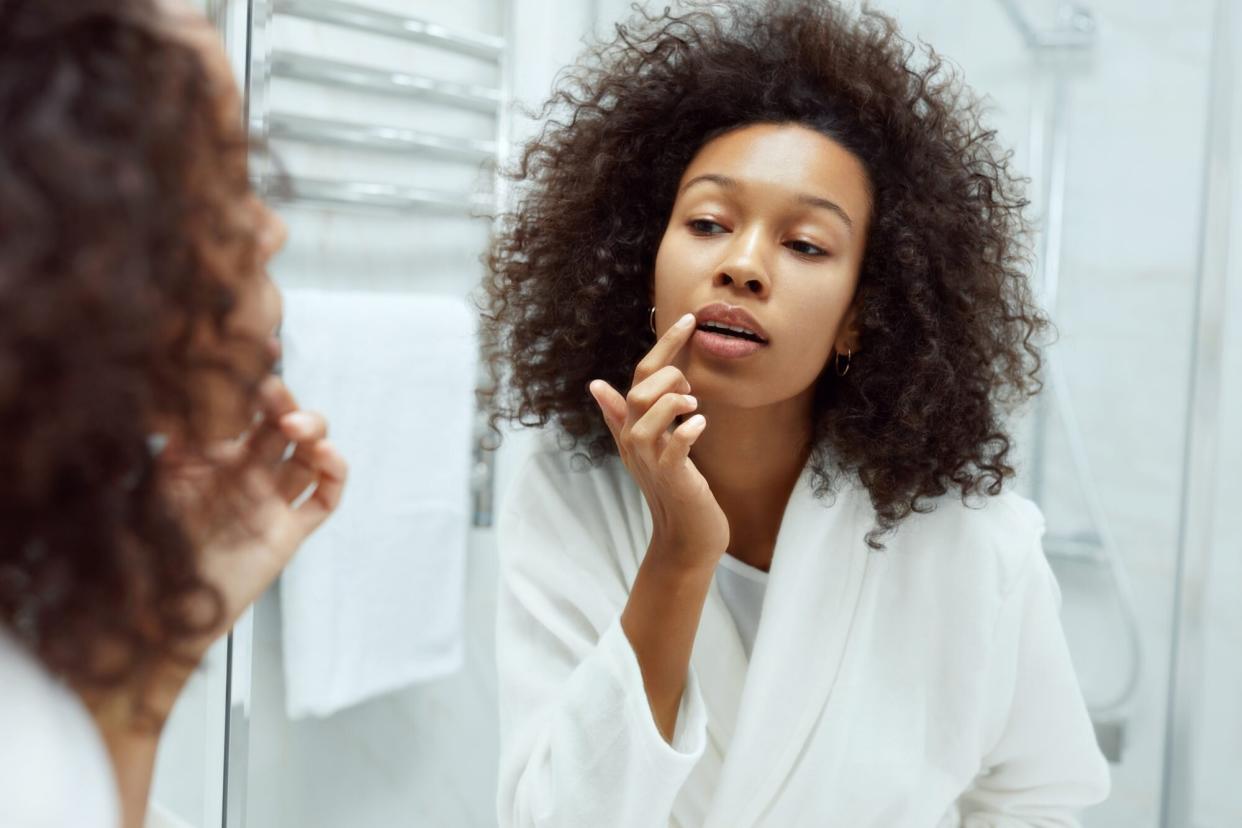How to Prevent and Heal Chapped Lips (Besides Just Using Lip Balm)

GETTY IMAGES
TABLE OF CONTENTS
On This Page
Causes of Chapped Lips
Symtpoms
Prevention
Healing
When to Seek Help
No matter what time of year it is, chapped lips are something most of us have struggled with at one point or another. While you may be tempted to keep applying lip balm or licking your lips for temporary relief, these habits can actually worsen the condition. Chapped lips occur when they become dehydrated and inflamed, but there are ways to prevent and heal dry, irritated lips.
Related: The Best Treatments to Heal Chapped Lips
Reasons Your Lips Are Chapped
While many people associate chapped lips with cold weather, there are many other reasons your mouth can become irritated. "The lips do not have oil glands—sebaceous glands that make sebum—so they cannot hydrate themselves like the rest of the face can," says Leslie Baumann, MD, a board-certified dermatologist. Cold weather, licking your lips, lack of water, and irritation from makeup or skin care products can all further dehydrate the lips and cause them to chap. Additionally, too much exposure to the sun can cause the lips to burn and feel dry.
Symptoms of Chapped Lips
You'll likely know when your lips have become chapped and treatment is necessary, but some common symptoms include:
Dryness
Irritation
Roughness
Peeling skin
Mild pain
How to Prevent Chapped Lips
Although the most common way to keep chapped lips at bay is by regularly applying lip balm, there are other prevention methods that work. Amanda Doyle, MD, FAAD, board certified dermatologist at Russak Dermatology, swears by these solutions: Avoid lip licking and irritating makeup, minimize exposure to cool or hot dry air, and reduce sun exposure. Additionally, it may help to run a cool-water humidifier in your room to keep the area hydrated.
How to Heal Chapped Lips
If you've followed the prevention tips above and your lips still feel chapped, it's time to be more diligent with your lip care routine. "Put a barrier repair moisturizer like Zerafite wrinkle defense on the lips at night and cover with an oil," says Dr. Baumann. Opt for argan oil, which contains soothing fatty acids.
In the daytime, apply lip products with both occlusives and humectants. "Occlusives coat and protect the surface, preventing water from evaporating away," says Dr. Baumann. "Humectants pull water into themselves." Oils, waxes, and petrolatum are occlusives, while glycerin and hyaluronic acid are humectants.
Ingredients That Help Chapped Lips
Look for lip balm, skin care, and makeup formulas with healing ingredients, rather than ones that exacerbate the discomfort. "Petrolatum works by sealing in moisture," says Dr. Doyle. "Hyaluronic acid works as a humectant to attract water and hydration." Additionally, products with ceramides—lipids that form the building blocks of the skin barrier—will also be effective at preventing and treating chapped lips.
Ingredients to Avoid
Just as there are ingredients that heal the lips, there are also ingredients that harm them. When choosing lip balm, makeup, skin care, and any other products you apply to the face, be wary of ingredients that dry out the skin. "Avoid anything with fragrances, dyes, glitters, and other possible irritants to allow the skin to remain less irritated and, in turn, less scaly, red, and dry," says Dr. Doyle. Additionally, stay clear of products with alcohol, lip-plumping ingredients like capsaicin, and hydroxy acids, as these can dehydrate the skin, cause inflammation, and burn your lips.
When to See a Dermatologist
It's possible that there's something else that can be causing your chapped lips beyond extreme weather and dehydration. "If chapped lips don't heal with these types of conservative measures after a week or two, it is best to see a dermatologist to make sure this isn't something more serious, like early precancerous lesions," says Dr. Doyle. "If you have significant sensitivity or pain, some topical prescriptions can help to speed up healing so in either case, it is best to see a dermatologist."

